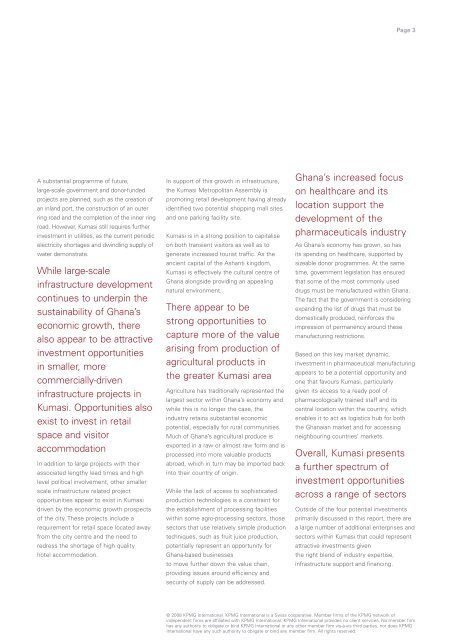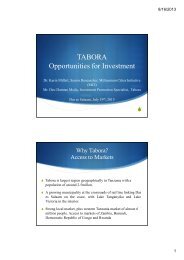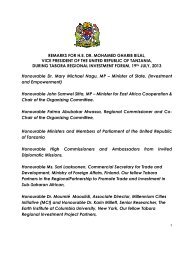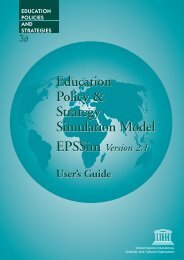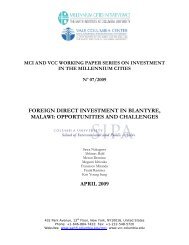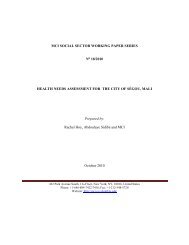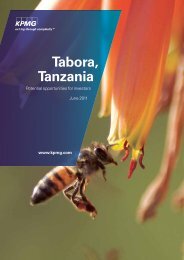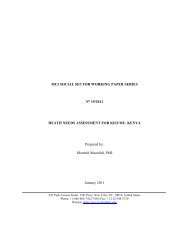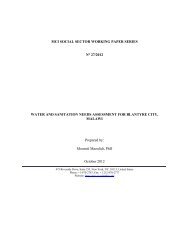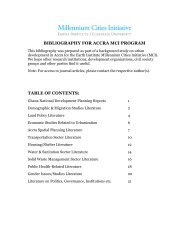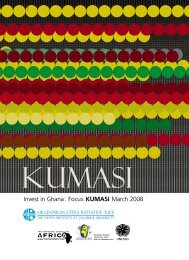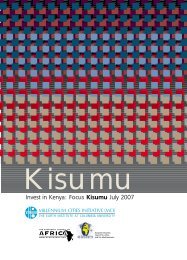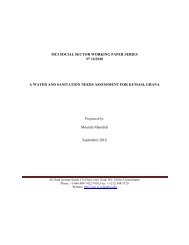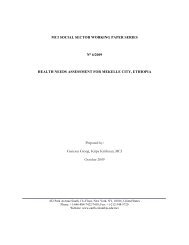Kumasi, Ghana: Potential Opportunities for Investors - Millennium ...
Kumasi, Ghana: Potential Opportunities for Investors - Millennium ...
Kumasi, Ghana: Potential Opportunities for Investors - Millennium ...
Create successful ePaper yourself
Turn your PDF publications into a flip-book with our unique Google optimized e-Paper software.
A substantial programme of future,<br />
large-scale government and donor-funded<br />
projects are planned, such as the creation of<br />
an inland port, the construction of an outer<br />
ring road and the completion of the inner ring<br />
road. However, <strong>Kumasi</strong> still requires further<br />
investment in utilities, as the current periodic<br />
electricity shortages and dwindling supply of<br />
water demonstrate.<br />
While large-scale<br />
infrastructure development<br />
continues to underpin the<br />
sustainability of <strong>Ghana</strong>’s<br />
economic growth, there<br />
also appear to be attractive<br />
investment opportunities<br />
in smaller, more<br />
commercially-driven<br />
infrastructure projects in<br />
<strong>Kumasi</strong>. <strong>Opportunities</strong> also<br />
exist to invest in retail<br />
space and visitor<br />
accommodation<br />
In addition to large projects with their<br />
associated lengthy lead times and high<br />
level political involvement, other smaller<br />
scale infrastructure related project<br />
opportunities appear to exist in <strong>Kumasi</strong><br />
driven by the economic growth prospects<br />
of the city. These projects include a<br />
requirement <strong>for</strong> retail space located away<br />
from the city centre and the need to<br />
redress the shortage of high quality<br />
hotel accommodation.<br />
In support of this growth in infrastructure,<br />
the <strong>Kumasi</strong> Metropolitan Assembly is<br />
promoting retail development having already<br />
identified two potential shopping mall sites<br />
and one parking facility site.<br />
<strong>Kumasi</strong> is in a strong position to capitalise<br />
on both transient visitors as well as to<br />
generate increased tourist traffic. As the<br />
ancient capital of the Ashanti kingdom,<br />
<strong>Kumasi</strong> is effectively the cultural centre of<br />
<strong>Ghana</strong> alongside providing an appealing<br />
natural environment.<br />
There appear to be<br />
strong opportunities to<br />
capture more of the value<br />
arising from production of<br />
agricultural products in<br />
the greater <strong>Kumasi</strong> area<br />
Agriculture has traditionally represented the<br />
largest sector within <strong>Ghana</strong>’s economy and<br />
while this is no longer the case, the<br />
industry retains substantial economic<br />
potential, especially <strong>for</strong> rural communities.<br />
Much of <strong>Ghana</strong>’s agricultural produce is<br />
exported in a raw or almost raw <strong>for</strong>m and is<br />
processed into more valuable products<br />
abroad, which in turn may be imported back<br />
into their country of origin.<br />
While the lack of access to sophisticated<br />
production technologies is a constraint <strong>for</strong><br />
the establishment of processing facilities<br />
within some agro-processing sectors, those<br />
sectors that use relatively simple production<br />
techniques, such as fruit juice production,<br />
potentially represent an opportunity <strong>for</strong><br />
<strong>Ghana</strong>-based businesses<br />
to move further down the value chain,<br />
providing issues around efficiency and<br />
security of supply can be addressed.<br />
Page 3<br />
<strong>Ghana</strong>’s increased focus<br />
on healthcare and its<br />
location support the<br />
development of the<br />
pharmaceuticals industry<br />
As <strong>Ghana</strong>’s economy has grown, so has<br />
its spending on healthcare, supported by<br />
sizeable donor programmes. At the same<br />
time, government legislation has ensured<br />
that some of the most commonly used<br />
drugs must be manufactured within <strong>Ghana</strong>.<br />
The fact that the government is considering<br />
expanding the list of drugs that must be<br />
domestically produced, rein<strong>for</strong>ces the<br />
impression of permanency around these<br />
manufacturing restrictions.<br />
Based on this key market dynamic,<br />
investment in pharmaceutical manufacturing<br />
appears to be a potential opportunity and<br />
one that favours <strong>Kumasi</strong>, particularly<br />
given its access to a ready pool of<br />
pharmacologically trained staff and its<br />
central location within the country, which<br />
enables it to act as logistics hub <strong>for</strong> both<br />
the <strong>Ghana</strong>ian market and <strong>for</strong> accessing<br />
neighbouring countries’ markets.<br />
Overall, <strong>Kumasi</strong> presents<br />
a further spectrum of<br />
investment opportunities<br />
across a range of sectors<br />
Outside of the four potential investments<br />
primarily discussed in this report, there are<br />
a large number of additional enterprises and<br />
sectors within <strong>Kumasi</strong> that could represent<br />
attractive investments given<br />
the right blend of industry expertise,<br />
infrastructure support and financing.<br />
© 2008 KPMG International. KPMG International is a Swiss cooperative. Member firms of the KPMG network of<br />
independent firms are affiliated with KPMG International. KPMG International provides no client services. No member firm<br />
has any authority to obligate or bind KPMG International or any other member firm vis-à-vis third parties, nor does KPMG<br />
International have any such authority to obligate or bind any member firm. All rights reserved.


